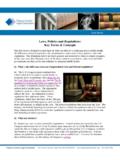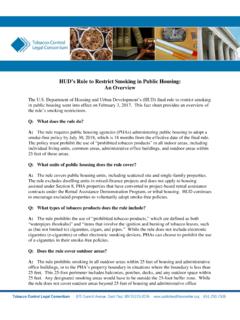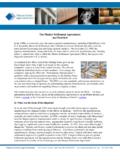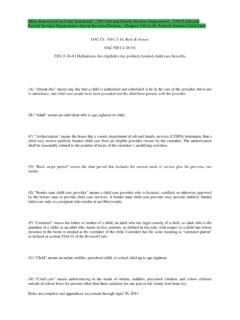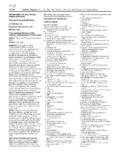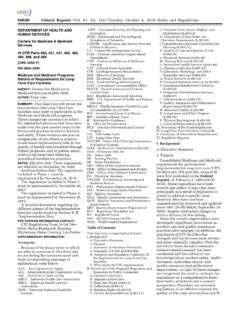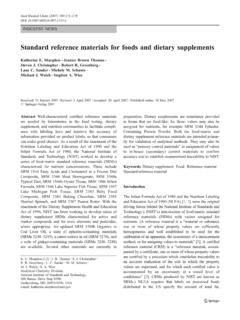Transcription of Healthier Beverage Policies & Drinks with Artificial ...
1 Public Health Law Center 875 Summit Avenue St. Paul, Minnesota 55105 Beverage Policies & Drinks with Artificial SweetenersHospitals implementing healthy Beverage Policies are replacing sugary drinks1 with Healthier Beverage options in their vending machines, soda fountains, catering services and other food services. These institutions are quickly faced with questions about whether to include beverages that have been sweetened with Artificial or non-caloric sweeteners. Tap water and unsweetened lowfat/nonfat milk are still the healthiest replacements for sugary Drinks and contribute to the body s daily nutrient needs. Unsweetened coffee and tea, and 100% fruit or vegetable juices (in appropriate serving sizes and with sodium limits, as applicable) also rank high as healthy Beverage options.
2 A review of model Beverage standards2 reveals that many model standards include another option low or no calorie beverages, which may include so-called The Public Health Law Center has created a series of resources designed to inform and support efforts to promote healthy Beverage choices within workplace settings, with a special focus on healthcare. This fact sheet answers some of the commonly asked questions about Artificial HEALTHCAREP ublic Health Law Center 875 Summit Avenue St. Paul, Minnesota 55105 Beverage Policies & Drinks with Artificial Sweeteners | 2 diet Drinks ( Drinks sweetened with non-caloric or Artificial sweeteners). Many institutions are choosing to include diet Drinks as replacements for sugary Drinks , with the rationale that they would like to offer the widest range of low/no-calorie beverages as possible and diet Drinks are preferable to sugary beverages in terms of calorie and carbohydrate regulations permit the use of some Artificial sweeteners in food and beverages, and some national authorities recognize that artificially sweetened Drinks can be a useful alternative to sugary beverages as a calorie reduction strategy.
3 Research on the overall health impacts of consuming Artificial sweeteners (including impacts related to obesity concerns as well as chronic disease risk) remains inconclusive. In a 2012 analysis of available research, the Centers for Disease Control and Prevention (CDC) noted that while switching from sugary to diet Drinks as a calorie reduction strategy may contribute to short term weight loss,3 it is unclear if long-term consumption leads to weight loss, weight maintenance or even weight gain. 4 While there can be positive calorie reduction benefits in switching from sugary to artificially sweetened beverages, a growing body of research suggests that a simple net calorie calculation may not tell the whole story. The potential weight loss and other health impacts of diet drink consumption appear to be more complex and warrant continued research.
4 What Are Artificial Sweeteners?For purposes of this document, we use the phrase Artificial sweeteners to refer to all substances that are added to food and Drinks to make them taste sweeter, without adding other nutrients or calories (or few calories). Some experts also refer to these as nonnutritive sweeteners 5 or low calorie or non-caloric The term as used in this document includes sweeteners derived from stevia In 2012, the American Heart Association and the American Diabetes Association issued a Scientific Statement on Artificial sweeteners, which they refer to as nonnutritive sweeteners. 7 They examined the question of whether Artificial sweeteners reduce caloric intake, suppress appetite and/or reduce weight. They noted the lack of data on the impact of Artificial sweeteners and concluded that the research to date is inconclusive: The evidence reviewed suggests that when used judiciously, [nonnutritive sweeteners] could facilitate reductions in added sugars intake, thereby resulting in decreased total energy and weight loss/weight control, and promoting beneficial effects on related metabolic parameters.
5 However, these potential benefits will not be fully realized if there is a compensatory increase in energy intake from other sources. 8 Public Health Law Center 875 Summit Avenue St. Paul, Minnesota 55105 Beverage Policies & Drinks with Artificial Sweeteners | 3or sugar alcohols. Most Artificial sweeteners have a higher intensity of sweetness per gram as compared to sugar, offering roughly 150 to over 600 times the sweetness of sugar with no or few Artificial sweeteners are used in diet and other beverages and food products to reduce the number of calories and carbohydrates in these Are Artificial Sweeteners Regulated?Under federal law, substances including Artificial sweeteners may only be used in food or beverages if the use is permitted by the Food and Drug Administration (FDA) through a food additive regulation or if the use is generally recognized as safe (GRAS).
6 10 The FDA has issued food additive regulations for at least seven Artificial sweeteners: acesulfame-potassium,11 aspartame,12 mannitol,13 neotame,14 saccharin,15 sucralose,16 and These food additive regulations specify how these substances may be used in food in what types of food, in what quantities, and for what uses. The FDA has also designated uses of certain Artificial sweeteners as Over a dozen companies have submitted notices to the FDA that they have determined that stevia-based sweeteners are GRAS, and the FDA has not questioned these What Are the Recommended Practices Around Children and Artificial Sweeteners?Artificially sweetened beverages are not generally recommended for The Robert Wood Johnson Foundation s Healthy Eating Research Program convened an expert panel to develop a set of healthy Beverage guidelines.
7 These guidelines do not recommend beverages with added sweeteners (whether caloric or non-caloric) for children under 14 years For older youth, the only consensus is that water and milk continue to be the best healthy options. The Institute of Medicine recommended standards for foods and beverages sold or served in schools include artificially sweetened beverages only as an option for high school aged youth, after the school day Department of Agriculture (USDA) regulations do not allow Drinks with added sugars, nor artificially sweetened Drinks , to be sold at all in elementary and middle schools, or through the National School Lunch and Breakfast However, the USDA will continue to allow artificially sweetened beverages to be sold in high What Does Generally Recognized as Safe Mean When It Comes to Food Safety?
8 In most cases, food companies are responsible for deciding whether the use of a substance in food is generally recognized as safe or GRAS. In the past, the FDA has affirmed the GRAS status of many substances added to food but due to lack of resources, the FDA announced in 1997 that it would no longer review GRAS affirmation petitions and instead would accept GRAS notifications submitted by manufacturers or other interested parties and respond with a no questions letter, a letter stating there is an insufficient basis for the GRAS determination, or a letter ceasing review at the company s Under the current system, companies are not required to notify the FDA about their GRAS determinations, though they often do The Institute of Medicine recommended standards for foods and beverages sold or served in schools include artificially sweetened beverages only as an option for high school aged youth.
9 After the school day Health Law Center 875 Summit Avenue St. Paul, Minnesota 55105 Beverage Policies & Drinks with Artificial Sweeteners | 4schools as competitive foods (which are foods sold outside of the national school meal programs, through a la carte menus, vending machines, fundraisers, school stores, etc.). This federal interim final rule, which went into effect in July 2014, states that in addition to unflavored water, calorie-free flavored water, low- and non-fat milk, and 100% fruit and/or vegetable juices (which may be diluted with water but may not have added sweeteners), the sale of other low- and no-calorie beverages will be allowed (within specified size and calorie limits) during and outside of the school day in high It should be noted that states can pass their own competitive food regulations that are more restrictive than federal law.
10 Do Diet Drinks Really Help with Weight Loss?Research on the implications of using artificially sweetened beverages as a substitute for sugary Drinks and dietary aid is not conclusive. Research has consistently shown, and most authorities agree, that individuals who switch from sugary to artificially sweetened Drinks do reduce their calorie intake from However, some research findings also indicate that individuals drinking artificially sweetened beverages may still end up consuming many additional calories through other food and beverages, ultimately nullifying the overall calorie reduction achieved by drinking a diet A growing, but not definitive, body of research suggests the possibility that drinking beverages with Artificial sweeteners may actually be detrimental to reducing preferences for sugary foods.
